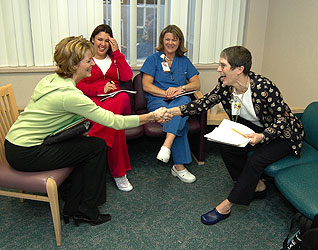| Mentoring
Nurses to Conduct Research Studies |
|||||
|
|||||
| Associate professor mentors
St. Joseph Hospital nurses on how to conduct research studies.
December 15, 2005 There’s a new thermometer on the market, one that claims to obtain accurate temperature readings with a simple swipe of the forehead. But, does it work with feverish children? Emergency room nurses at St. Joseph Hospital want to know, because if it does, it could replace oral, under-arm and rectal thermometers. Rectal thermometers often are used on babies and are considered the most accurate readers of temperature. Dana Rutledge, associate nursing professor, is helping the St. Joseph nurses figure out the answer by devising a study that will test the new temporal artery thermometer against the rectal thermometer. “We make clinical decisions based on temperatures, and if this works, it would be an ideal way to take temperatures, especially kids temperatures,” said Rutledge, who spends one day each week at St. Joseph Hospital helping nurses excel in their research endeavors under an agreement between Cal State Fullerton and the hospital. “This kind of contract is very common on the East Coast and it’s considered good,” explained Rutledge, “because you get teachers connected to the reality of the nursing profession.”
Rutledge began working with St. Joseph’s nurses last year. She has created journal clubs made up of nurses from different units who meet regularly to review nursing research and determine if study findings are worthy of a trial. The intensive care unit nurses, for example, have reviewed research that deals with weaning patients off ventilators through trials such as altering respirator settings and medications, and have begun implementing specific findings in an effort to help patients get back to breathing on their own. As part of her work at the hospital in Orange, Rutledge is reviewing clinical narratives written by the nurses to see if they reflect a theory that emphasizes caring in nursing as a way to help patients get better sooner. “We’re looking for evidence of caring behaviors as viewed through the Watson model,” Rutledge said. “Nurses write about their interactions with patients and reflect on how they made a difference....A special bond exists between patient and nurse and there are certain things nurses can do to promote caring.” Rutledge “has created awareness of evidence-based nursing practice and research and empowered the staff nurses to conduct nursing research and ask, ‘Are we doing the best for our patients based on literature and outcomes,’” said Patti Aube, St. Joseph Hospital’s director of education. With Rutledge’s guidance, the nurses are gaining valuable knowledge that helps them improve patient care, Aube added. “Nurses who reflect upon their practice and think about what it is based upon make better clinical decisions, and this, in turn, leads to better patient outcomes,” Rutledge said. “Nurses who seek the best evidence for practice can make a difference.” |
|
